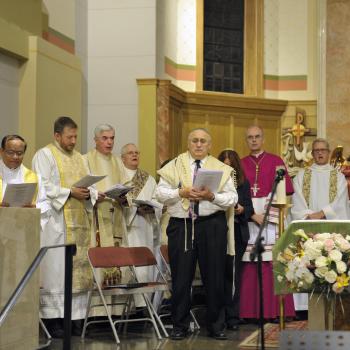It’s all about grace.
This essay is not particularly religious—the author admits she was raised Catholic but now numbers herself among those who are “spiritual but not religious”—but it strikes me as having the seeds of a compelling Thanksgiving Day homily.
Most nights of my childhood, my parents and my siblings and I sat down to dinner together, and my father said the Catholic version of the prayer before meals: “Bless us, Oh Lord, and these thy gifts, which we are about to receive from Thy bounty, through Christ our Lord, Amen.”
Once I left home, though, saying grace dropped out of my life. For years it wasn’t something I practiced, or even thought about; it was a relic I was content to leave behind, along with martyred saints and fish on Fridays.
Lately, though, I’ve been rethinking the practice of grace. I haven’t become suddenly church-going; like many Americans, “spiritual but not religious” is as close as I come to a path. But as someone who feels compelled to investigate the complexity of the effort it takes to bring food into our lives, I’ve begun to be troubled at the way we dive into meals without a pause to take stock.
I started to contemplate this when I was visiting farms in France last summer. Every meal I’ve experienced there — in a restaurant, in a friend’s house, with strangers — has begun with “Bon appetit!” Your host, or your waiter, says it to you, and everyone at the table says it to each other. For years this seemed to me a charming custom, but not very meaningful; one of those things you learn to do to fit into a new culture, along with keeping both hands above the table and never filling your own glass. But hearing farmers wish it to each other, mere hours after the food they had raised had made its transition from animal to ingredient, made me perceive “Bon appetit” in a new way. What I heard was a moment of acknowledgement for the effort they had expended, and appreciation for the pleasure they were about to share.
It didn’t feel mannered or old-fashioned; it felt courteous, and grown-up, and fresh. It felt like a new kind of grace, secular but still heartfelt, and it made me wonder whether I had discarded too quickly a practice that could still contain meaning.
Next week, of course, is Thanksgiving: a holiday whose essence is saying Thank You, and which is probably the day in the year when even the most unchurched perform some sort of observance before their meal. With Thanksgiving in mind, I asked friends whether they say grace — and what they said in reply made me realize how many ways there are to express gratitude for the food we eat.
There’s ample food for thought. Read on.












